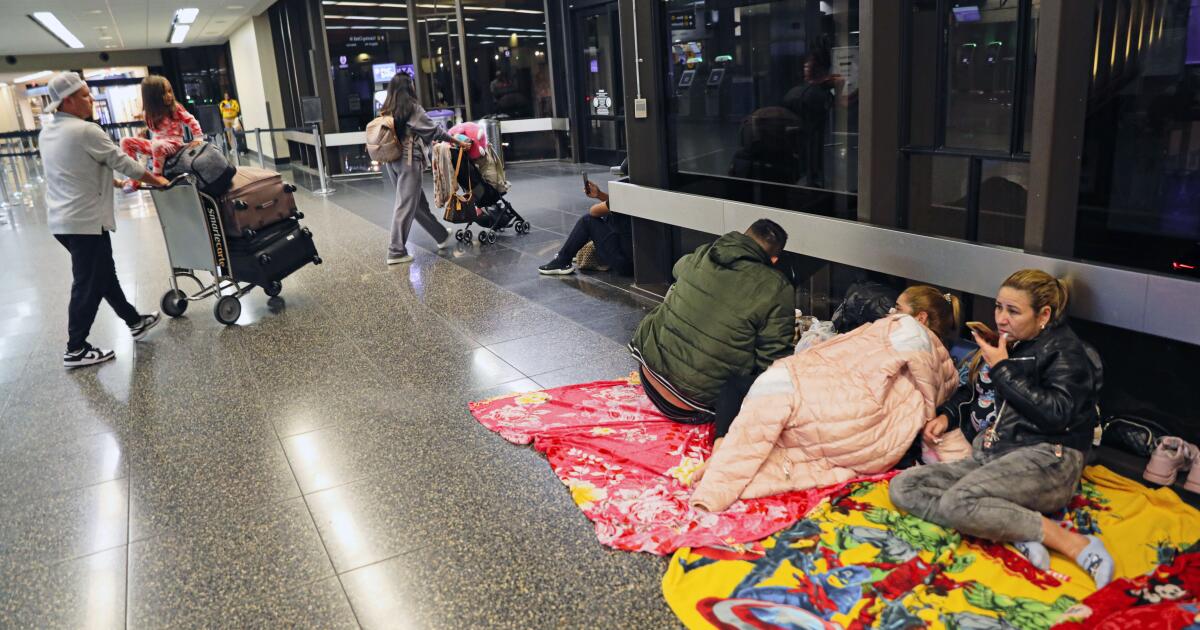
Leaders in Democratic cities must find it particularly galling to be mentioned in the same breath as the Republican governors of Texas and Florida regarding their policies on migrants.
But that’s been happening as cities such as New York, Chicago and Denver find themselves lacking the resources to provide enough shelter and services for incoming migrants — and are resorting to busing and flying many of them out of town.
San Diego also has been overtaxed by the increase in migrants, though it is in a slightly different position than the aforementioned cities because the region is more of a way station for migrants hoping to land elsewhere.
The destinations are often other overburdened big cities, which has created tension among Democratic government leaders across the country. In San Diego, one nonprofit migrant advocacy group has assailed the performance of another.
But overall, the public discussion of this has been largely muted compared with the outrage when Govs. Greg Abbott of Texas and Ron DeSantis of Florida sent migrants to the Democratic enclaves of New York, Washington, Los Angeles, Sacramento and elsewhere — including tiny Martha’s Vineyard off Massachusetts.
Granted, Abbott and DeSantis were making a political point by giving Democratic strongholds a sense of what their states have experienced and were criticized for using migrants as props.
But they also had motives similar to some big-city Democratic mayors — to give relief to overwhelmed local agencies in their states on the front lines of the immigration influx.
The Texas border city of El Paso, led by Democratic Mayor Oscar Lesser, this fall re-started its own charter-bus program — separate from Abbott’s — to send migrants to other areas. In late September, city officials said the arrival of 2,000 migrants a day had brought El Paso to the “breaking point.”
The Democratic mayors and governors maintain they have tried to provide proper assistance to migrants, to the degree possible, in their jurisdictions and are sending them elsewhere on a voluntary basis. Texas and Florida officials have said they are doing things no differently.
However, some migrants sent from those two southern states said they were misinformed about their destination and about job prospects when they got there.
The federal government also has been struggling with increasing pressure on the asylum processing system and enforcement along the border with Mexico.
Meanwhile, Democratic leaders in Congress, states and cities have been vocal in urging President Joe Biden to take stronger action to bring migration under control and provide more assistance for local governments.
Some Democrats have started echoing Republican prescriptions of more limited asylum and tougher border enforcement, among other things.
Along with the impact of migrants on the regions they represent, the threat of a political backlash over immigration in next year’s elections is very much on the minds of Democrats. That’s not just a concern regarding swing districts and control of Congress, but in heavily Democratic areas where residents are expressing frustration about migrant shelters and displacement of neighborhood services and facilities.
Denver has received migrants from other areas like El Paso via bus and, in turn, spent local dollars to provide services, shelter and, in some cases, transportation to relocate them.
After Colorado Gov. Jared Polis chartered buses to send migrants out of town, the mayors of Chicago and New York City wrote him a letter asking for a halt to the practice, saying “overburdening other cities is not the solution,” according to the Associated Press.
Meanwhile, Chicago and New York City also have shipped migrants out of town, with the latter providing asylum seekers one-way plane tickets to anywhere in the world.
San Diego, another Democratic city and county, hasn’t been caught up in the intraparty crossfire, at least not in public. But government agencies at all levels and nonprofits have struggled to provide temporary shelter, services and travel arrangements and to secure funding to get migrants to their hoped-for destinations.
The county Board of Supervisors in September declared a humanitarian crisis for migrants who were being dropped off by the thousands at transit stations by federal border agents. Though the focus in San Diego has long been on migrants from Mexico and Central America, local agencies say they are now dealing with people from from 100 countries.
In addition to seeking more federal funding, the supervisors in October agreed to allocate $3 million to help nonprofits continue to provide services to arriving migrants, including creating a new migrant center, according to The San Diego Union-Tribune.
Part of the service is to assist migrants to continue their journey to friends, families and sponsors across the U.S. after crossing the border and being processed by Border Patrol.
In recent weeks, more than 100 migrants have been sleeping at San Diego International Airport each night awaiting flights. That’s happened before, but in smaller numbers.
A leader of one nonprofit criticized SBCS, a local nonprofit that received funding to operate the migrant center and has been helping migrants move to their ultimate destination, among other things.
Lindsay Toczylowski, executive director of Immigrant Defenders Law Center told KPBS some migrants are being sent to cities where they have no sponsor or support system.
“That is no different than what Governor (Greg) Abbott does in filling buses in Texas and sending them to other places around the country,” Toczylowski said.
SBCS, formerly known as South Bay Community Services, defended its management of the center and overall operations to KPBS, which noted the center offers free food and access to WiFi, phone chargers to migrants and deploys volunteers who help with travel arrangements. In some cases, SBCS puts people with limited means in hotels and pays for their airfare.
Meanwhile, SBCS and county Supervisor Nora Vargas, the board chair, said the $3 million allocated for the migrant center may last only two months rather than the three initially anticipated, KPBS reported.
In addition to the dwindling resources and jousting over moving migrants around the country, local, state and federal governments face another fast-approaching problem: the elements.
Winter in San Diego is not as severe as in Chicago, Denver or New York, but it can still be life-threatening for people without shelter, whether a migrant or a homeless resident.







